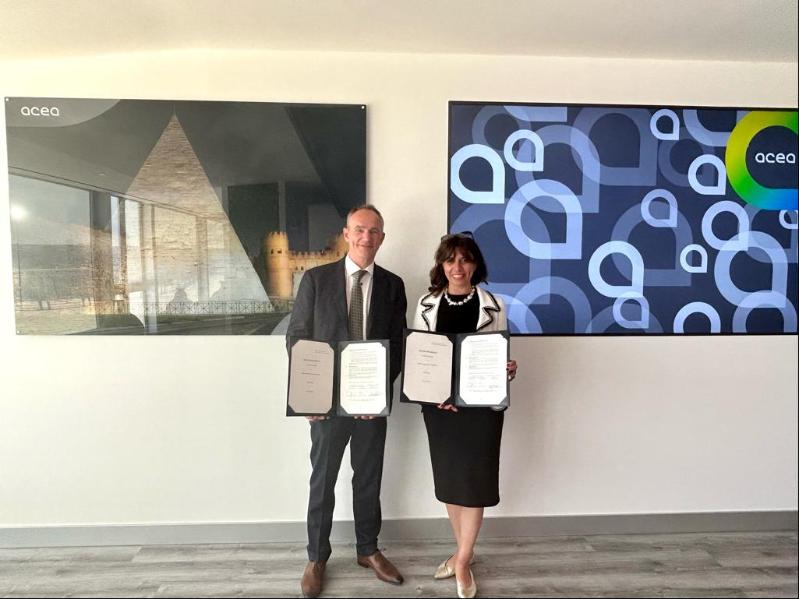
- The EIB-financed investments will help improve integrated water service coverage and quality, cutting water losses and increasing energy efficiency.
- The EIB support will also enable Acea to make the water supply more resilient to future extreme weather events such as drought.
- Italy was the biggest beneficiary of EIB resources for the water sector from 2016 to 2022, receiving €2.9 billion.
The European Investment Bank (EIB) has provided a €435 million loan to Acea with the primary goal of strengthening and improving infrastructure for more efficient and resilient water services. The transaction signed by EIB Director General of Operations Jean-Christophe Laloux and Sabrina Di Bartolomeo, Chief Financial Officer today in Rome is the first, €235 million tranche of a loan totalling €435 million approved by the EIB Board of Directors.
The EIB is co-financing the 2023-2026 investment plan of Acea Ato 2, the Acea Group company responsible for managing water services in Rome and the surrounding area. The aim is to help modernise water and wastewater infrastructure, improving integrated water service coverage and quality and making operational efficiency gains such as cutting water losses and increasing energy efficiency. The EIB funds will also contribute to making water services more resilient to future extreme weather events such as drought via investments in network efficiency, the interconnection of water systems and water resource management.
This operation confirms the EIB's position as Acea’s biggest key lender with around €1 billion in total allocations, further consolidating the already excellent relationship between the two organisations.
“As the EU climate bank, we are delighted to support Acea Ato 2’s investment plan for integrated water services, providing quality of life improvements for users and ensuring a more reliable, sustainable and resilient water supply,” said EIB Director General of Operations Jean-Christophe Laloux. “
"This loan, in support of investments for the improvement and upgrade of the city of Rome’s water infrastructure, is a clear acknowledgement of Acea’s commitment to the development of sustainable infrastructures and consolidates the group’s relationship with the EIB, which is one of the largest lenders to the European water sector” said Sabrina Di Bartolomeo, Chief of Financial Officer of ACEA.
Strong EIB support for Italy’s water sector
The EIB is the EU climate bank and one of the world's largest lenders to the water sector, with over 1 600 projects and around €80 billion in funding granted since 1958. Italy was the biggest beneficiary of EIB resources for the water sector from 2016 to 2022. The EIB financed 40 operations in the country during this period, providing a total of €2.9 billion and helping to unlock about €8.9 billion in investment. The loan to Acea announced today comes in addition to those recently signed with CAP Group, Tea Spa, Alfa S.r.l, Veritas, SMAT, Iren Group, CIIP and Acque.
Background information
European Investment Bank (EIB)
The European Investment Bank (EIB) finances projects in four priority areas: infrastructure, innovation, climate and environment, and small and medium-sized enterprises (SMEs). Between 2019 and 2022, the EIB Group provided €45 billion in financing for projects in Italy.
Acea
Acea is one of Italy’s leading industrial groups. Listed on the stock exchange in 1999, it manages and develops networks and services in the water, energy and environment sectors. Its activities include integrated water services, electricity distribution, public and artistic lighting, electricity and gas sales, energy production (mainly from renewable sources) and waste treatment and recycling. Acea is Italy’s biggest water service operator, serving around 9 million residents of Lazio, Tuscany, Umbria, Molise and Campania. It is also a key player in energy distribution across the country (providing around 9 TWh of electricity in the city of Rome) and in energy sales (with around 8 TWh of electricity sold). Lastly, Acea is among the main environment sector operators in Italy, with about 1.7 million tonnes of waste managed a year.